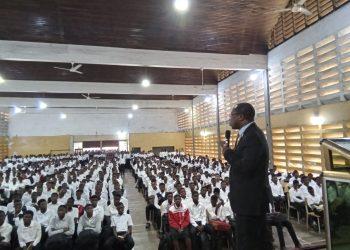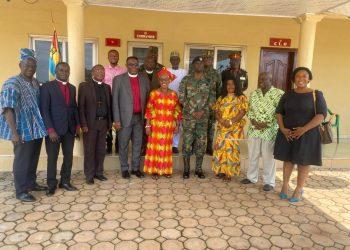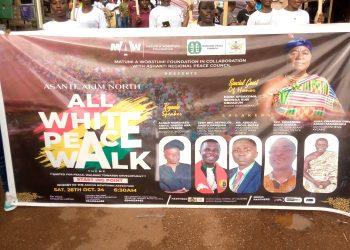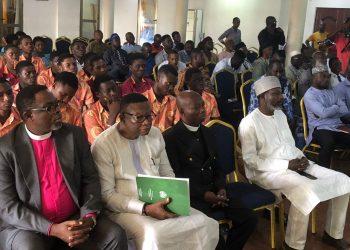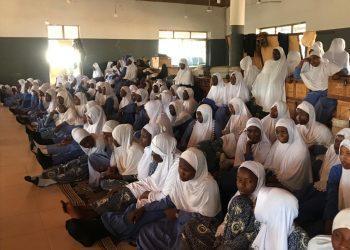Ashanti Regional Peace Council
Ashanti region is located almost in the center of the country, with Kumasi as its capital. It occupies a total land surface of 24,389 km2 or 10.2 per cent of the total land area of Ghana. According to the 2010 population and housing census, the region had a population of 4,780,380, making it the most populous region in Ghana.
The current population of the Region according to the 2021 population and housing census is 5,440, 463. The population of the Males is 2,679,914 (49.3 %) and the females constitute 2,760,549 (50.7%).
It lies between longitudes 0.15W and 2.25 W, and latitudes 5.50N and 7.46N. The region shares boundaries with four of the 16 political regions; Brong Region in the North, Eastern Region in the east, Central Region in the south and Western Region in South West.
The region’s share of the national population increased from 16.5 per cent in 1960 to 17.3 per cent in 1970 but remained almost the same (17.0%) in 1984 before increasing to 19.4 % in 2010. The region’s population growth rate was 2.9 per cent per annum in 1970, dropped to 2.5 per cent per annum in 1984 and increased to 3.4 per cent in 2000, 1.3 times higher than the national average growth rate of 2.7 percent. The population growth rate of the region in 2000 is the second highest in the country, after the Greater Accra Region (4.4%). Although the region is the most populous, its density (148.1/sqkm) is lower than those of the Greater Accra region (895.5/sq km) and the Central region (162.2/sq km).
The Ashanti Region currently has a total of forty – three (43) administrative Districts, Municipals and Metropolitan with Kumasi as its Regional Capital. Out of the 43, there are eighteen (18) Municipals, one (1) Metropolitan and twenty four (24) Districts.
ASHANTI REGIONAL PEACE COUNCIL (ARPC)
The Ashanti Regional Peace Council (ARPC) started with the establishment of the Regional Secretariat with two staff positions in September 2013, thus Regional Executive Secretary and Administration Manager. On the 1st September, 2014 the Council was officially inaugurated with the 13 eminent Board Members as stipulated in Section 9 and 12 of the NPC, Act 2011 (Act 818). Prof. Seth Opuni Asiama was the elected Chairman for the first Council after its inauguration in 2014.
In accordance with Section 5 of the NPC, Act 2011 (Act 818), the first Council’s tenure ended in September 2018 and a new (second) governing Board was constituted and inaugurated on the 9th November, 2018. The Chairman for the Second governing Board of the Council was Right Reverend Christopher Nyarko Andam. The Second Council’s tenure ended in September, 2022 and the Third governing Board (Council) was constituted and inaugurated on 8th December, 2022 The new elected Chairman for the governing Board of the Council is Dr. Harriet Takyi. The 13 eminent Board Members of the Ashanti Regional Peace Council are as follows;
Catholic Bishops Conference (Fr. Dr. Anthony Frangtana Naah)
Christian Council (Rev. Dr. Seth Frimpong Coleman)
The Ghana Pentecostal Council (Apostle Dr. Bright Bill Kwabla Sosu )
National Council for Christian and Charismatic Churches (Bishop. Dr. Victor Osei)
Ahamadiyya Muslim Mission (Mr. Hakeem Baidoo)
Al-sunnah Muslims (Sheikh Mohammed Kamil Mohammed)
Tijaaniya Muslim Group (Ustaz Ahmed Seidu)
Practitioners of African Traditional Religion (Baffour Asabere Kogyawoasu Ababio III )
Two persons nominated by the Regional Co-ordinating Council one of whom is a woman
Right Reverend Dr. Nuh Ben Abubekr
Ms Margaret Boafo – Atiemo
Two other persons nominated by the identifiable groups
Esmeranda Manful (Dep’t of Sociology and Social work, KNUST)
Harriet Takyi (Women in Peace Building, Kumasi )
One representative of the Regional House of Chief
Baffour Owusu Bediako (Domeabramanhene)
The ARPC since its establishment has successfully coordinated the resolution process and management of some conflicts which would have otherwise escalated into violent conflicts in the Region. These conflicts have been listed in the table below;
| 1. Juansa Saviour Church crisis | 18. Onwi Land resource conflict |
| 2. Sanso – AGA conflict | 19. Abrakaso Chieftaincy conflict |
| 3. Agogo –Fulani Herdsmen Conflict | 20. Jamasi conflict |
| 4.Pakyi No. 2 Land resources/Chieftaincy conflict | 21. Boankra Conflict |
| 5. Land resource conflict at Kurofa | 22. Allabar Lorry Terminal Dispute |
| 6. Suame Magazine boundary dispute | 23. Foase Conflict |
| 7. Daban/Apraman Church of Christ Conflict | 24. Garages Association and Nigeria spare-parts dealers conflict |
| 8. Nyinahin Chieftaincy conflict | 25. Odaho Conflict |
| 9.Tafo Conflict | 26. Abenase Chieftaincy Conflict |
| 10. Kuntenasi Adwafo Chieftaincy | 27. Apinkra Chieftaincy Conflict |
| 11. Ntonso Youth Clashes | 28. Hwereso Chieftaincy Conflict |
| 12. Mampongten Youth Clashes | 29. Amankyim Akrofrom Chieftaincy conflict |
| 13. Ejura Clashes | 30. Akrokyere Chieftaincy Conflict |
| 14. Asawasi Red Park Dispute | 31. Bodwesango Chieftaincy conflict |
| 15. Ahwiaa Youth Clashes | 32. Ayaase Chieftaincy conflict |
| 16. Abattoir conflict | 33. Daabaa clashes |
| 17. Buzu Leadership Crises | 34. Krobo Chieftaincy Conflict |
| 35. Nyinawusu /Akoraboakrom Murder incident | |
| 36. Apitikoko Land Resources conflict | |
| Nsuta /Kwamang Diputes over claims of Towns: | |
| · 37. Kyeiase | |
| · 38. Abodease | |
| · 39. Atonsu | |
| · 40. Birim | |
| · 41. Jeduako | |
| · 42. Anyinofi | |
| · 43. Kyekyebon | |
| 44. Atwima Akrofrom chieftaincy conflict | |
| 45. Sanso Chieftaincy | |
| 46. Offinso Chieftaincy | |
| 47. Tafo – Pankrono Youth Clashes | |
| 48. Anyinamu | |
| 49. Bediemu | |
| 50. Korkortuhiah | |
| 51. Anwiamu | |
| 52. Badukrom | |
| 53. Abadwum | |
| 54. Nkenkenso | |
| 55. Danso (Bosome Freho) illegal mining | |
| 56. Nweneso No 1 | |
| 57. Denyase Chieftaincy | |
| 58. Sabronum dispute | |
| 59. Akomadan Election violence | |
| 60. Mankranso Election violence | |
| 61. Ahafo Ano North (Tepa) Election violence | |
| 62. Ejura Police Station Destruction | |
| 63. Obuasi Galamsey Miners and Military clashes | |
Regional Executive Secretary
Rev. Dr. Emmanuel Badu Amoah is the Regional Executive Secretary of the National Peace Council, Ashanti Region. He is an accomplished preacher, scholar, researcher, and administrator with over 24 years of dedicated service in peacebuilding, conflict resolution, and social transformation in Ghana and West Africa.
Rev. Dr. Amoah earned his PhD in African Studies from the Institute of African Studies at the University of Ghana in 2022. He holds a Bachelor of Arts (Hons.) in Sociology with Philosophy from the University of Ghana (2005) and a Master of Philosophy in Human Rights from the University of Education, Winneba (2011). To enhance his expertise in peace and conflict studies, he has also undertaken advanced professional training through short courses and workshops at the United States Institute for Peace (USIP), the United Nations Institute for Training and Research (UNITAR), and the Kofi Annan International Peacekeeping Training Centre (KAIPTC) in Accra.
Rev. Dr. Amoah is widely respected as a mediator, peace educator, and peace analyst, known for his insightful contributions to various social science issues. He has a proven track record of effective institutional leadership and visionary management, driving significant progress in organizational transformation.
With exceptional interpersonal and communication skills, Rev. Dr. Amoah has effectively engaged and influenced leaders across chieftaincy, political, and civil society spheres. His expertise has been instrumental in assisting with the resolution of over 32 chieftaincy conflicts at various stages.
He has played a key role in several peace-building initiatives, including mediating the Ofoase and Agogo Herders-Farmer Conflict and the Abattoir clashes in Mayanka, Kumasi, which have contributed to sustainable peace in the region. Additionally, he has conducted over 200 peace education programs in secondary schools.
As the head of the technical team for peacebuilding, Rev. Dr. Amoah advises the Ashanti Regional Peace Council on resolving more than 62 inter-communal disputes. He provides strategic guidance for fostering sustainable peace across the region’s 43 Districts, Municipalities, and Metropolitan Areas.
Rev. Dr. Amoah is also the architect of various training programs tailored for general peacebuilding as well as targeted initiatives, including preventing political violence and violent extremism, particularly in mining communities in Ghana’s Central Region. His leadership in organizing community dialogues has impacted over 900,000 people, fostering conversations around building an inclusive nation (Ghana).
Rev. Dr. Emmanuel Badu Amoah’s visionary leadership and unwavering commitment to peace and social transformation continue to inspire and shape the landscape of conflict resolution and peacebuilding in Ghana and beyond.
Supporting Staff

GODWIN NANA AMPONSAH
(PROGRAMMES MANAGER)

PRINCE OSEI TUTU
(ADMINISTRATIVE MANAGER)

JOYCELYN ANIMA ABORAA BOATENG
(PROGRAMMES MANAGER)











